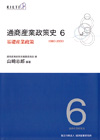-

-
Author(s)/Editor(s) Written and edited by YAMAZAKI Shiro Publisher Keizai Sangyo Chosakai ISBN 978-4-8065-2871-5 Publication Date July 2011
Table of Contents
This volume deals with policy measures implemented by the Ministry of International Trade and Industry's Basic Industries Bureau after the two oil crises in the 1970s and through 2000. Japan's basic materials manufacturers, which grew significantly during the postwar high economic growth period by supporting the development of other industries with a stable supply of high-quality materials, experienced severe difficulties in the subsequent years, hit by the oil crises and a sharp increase in the yen's value. Steelmakers, which grew into competitive players in the global market, were forced to the forefront of fierce trade battles and had to restrain their exports for the sake of maintaining Japan's good trade relationships with the United States and Europe, whereas non-ferrous metal manufacturers and petrochemical manufacturers had to streamline their production facilities drastically to shift toward high value-added products. Meanwhile, the development of new materials and a new generation of material industries, particularly in the bio sector, emerged as a new challenge.
- Foreword From countermeasures for the structural recession to the strengthening of international competitiveness
- Chapter 1 Chemical industry
- Chapter 2 Steel industry
- Chapter 3 Structural improvements in the non-ferrous metals industry
- Chapter 4 Nurturing the bio industry
- Chapter 5 Development of new materials
- Chapter 6 Reforms made in the alcohol industry
- Chapter 7 Safety control for chemical materials
- Afterword

